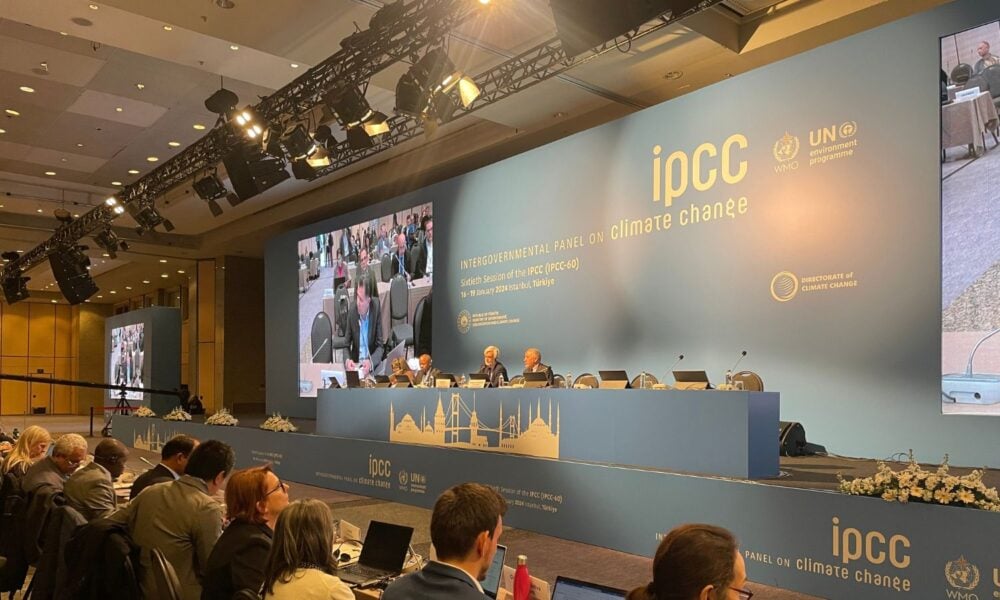I’m currently in Istanbul, Türkiye, with my colleague Adam Markham, for the opening session of the Intergovernmental Panel on Climate Change (IPCC) seventh assessment cycle. While the global understanding of climate change is well-established, the world’s response remains sluggish. It’s essential that as policies and public awareness evolve, the science keeps pace, offering the latest policy-relevant insights to effectively combat climate change.
The Union of Concerned Scientists is an official observer organization of the IPCC, and we traveled here because decisions are being made about the structure, topics, and processes that will guide the 7th assessment cycle, which is just getting underway.

Established in 1988 by the World Meteorological Organization and the United Nations Environment Programme under the United Nations, the IPCC is tasked with assessing climate change science. Its unique role lies in reviewing and synthesizing the latest scientific, technical, and socio-economic information relevant to climate change, thereby providing a solid scientific foundation for policy development at all levels and input to international climate negotiations.
The 6th assessment cycle concluded last year with the release of the Synthesis Report, and prior to that, reports from the three IPCC working groups. Overall, around 780 scientists from around the world participated in the assessment. You can read about the last assessment here. The IPCC has already authored dozens of reports over the years—so what should we expect from the 7th assessment? And importantly, what will be different this time around?
What promises to be different?
During the opening session today, the IPCC chair and a wide array of speakers outlined three important goals that set this assessment apart from past reports:
- A Leap Towards Inclusivity: The new assessment seeks to improve inclusivity in IPCC by engaging experts from the Global South, women, Indigenous voices, and early-career scientists. Notably, women now comprise 40% of the IPCC Bureau, reflecting meaningful progress, though there remains much work to do. The opening remarks stressed the importance of involving young authors, particularly those from the Global South, and pre-meeting surveys called for increasing Indigenous voices. This inclusive approach is crucial for overcoming biases that have historically favored the Global North and for gaining a more comprehensive understanding of climate change’s varied impacts and solutions, further enriching the assessment’s diversity and depth. The Task Group on data support for climate change is also implementing a new plan to make the data used in the IPCC more accessible, transparent, and traceable for scientists and policy-makers and the general public.
- Increased Policy-Relevant Assessments: With 2023 being the warmest year on record and record-breaking climate extremes experienced around the world, the urgency among the delegates here is palpable. While the IPCC is independent of any policymaking, the outputs are critical to inform policy work. Many would like to see the next assessment reports completed earlier than the typical 6-7 year cycle to better align with the second UNFCCC Global Stocktake due in 2028.
- Embracing Interdisciplinary Approaches: Opening statements also highlighted the need for emphasis on interdisciplinarity, particularly in the Special Report on Climate Change and Cities. This approach fosters early collaboration in the assessment cycle and extends to interactions with related assessment. With climate change touching almost every aspect of life, it’s crucial to bring in perspectives from multiple disciplines—including the social and physical sciences—to find solutions that address this complex, inter-connected crisis.
Upcoming decisions
This week the IPCC will make a number of key decisions that will shape the upcoming reports and process. Here are a few big topics that came up on day one.
What will be included in the report?
The IPCC typically consists of three working group reports focused on 1) the physical science basis of climate change; 2) impacts, adaptation, and vulnerability; and 3) mitigation of climate change. Based on comments collected from countries before this meeting it seems likely that this structure won’t change significantly, but there are other key structural questions being addressed.
Prior to this session, the IPCC had already decided to complete at least one special report on Climate Change and Cities, and a methodology technical report on short-lived climate forcers such as methane and hydrofluorocarbons . This week, discussions will revolve around the possibility of additional special reports, balancing the need for detailed analyses with the urgency of the climate crisis.
Additional Special Reports were suggested by various countries and cover a wide range of critical topics, including: how to address loss and damage from climate change, climate tipping points and climate system risks, climate change adaptation strategies, and the interactions between biodiversity and climate change. There’s also significant support from countries for additional products from the Task Force on National Greenhouse Gas Inventories, focusing on carbon removal technologies such as Direct Air Carbon Capture and Storage.
What will future meetings look like?
The first day started with a meaningful debate around the format of future IPCC meetings—virtual, hybrid, or in-person— which raised crucial considerations about budget constraints, carbon footprint, and meeting effectiveness. Representatives from many nations highlighted concerns over the limitations of virtual meetings for nations in the Global South that may lack stable internet connections, and argued that virtual meetings can impede effective participation. The discussion ultimately challenged the committee to fully consider what inclusive structures look like for equal engagement throughout the IPCC cycle.
Will there be any expert meetings or workshops?
The IPCC can pull together expert meetings and workshops to provide a space for a deep dive into a specific topic to support IPCC working groups, without requiring the commitment of a Special Report. During the last cycle the IPCC completed expert meetings on Mitigation, Sustainability and Climate Stabilization Scenarios; Climate Risk Management; Land Use, Climate Change and Food Security; and Communications. During our time here, we’ll hear a number of proposals for expert gatherings.
When will the reports be published?
A key part of the discussions is the timeline of these reports. As climate change continues to progress rapidly, impacting more and more people, there is a pressing need for this assessment cycle to be more deliberate in providing and communicating the scientific information policymakers need, within policy-relevant timeframes. A pressing concern is the alignment of these reports with the next UNFCCC Global Stocktake (GST), particularly given the existing disconnect between the 6-7 year IPCC cycle and the 5-year GST intervals. The GST is critical, especially this decade, as it serves as a comprehensive assessment of global progress towards achieving the long-term goals of the Paris Agreement, crucial for guiding intensified global efforts to address the escalating challenges of climate change.
The path forward
The IPCC reports come together through the collaboration of 195 member countries in a concerted effort to understand and address climate change. Because of this consensus-based model, over the next week there will be significant discussion to get member nations on the same page. As we move forward, it’s clear that the IPCC’s role in informing policy and guiding international cooperation is more critical than ever in our collective fight against climate change. During the opening remarks, UN Environment Programme Executive Director Inger Anderson stated that, “The IPCC seventh cycle may be the most important yet.” We are in a critical moment and the decisions made here will not only shape the IPCC’s work but also the global response to one of the most pressing issues of our time.

